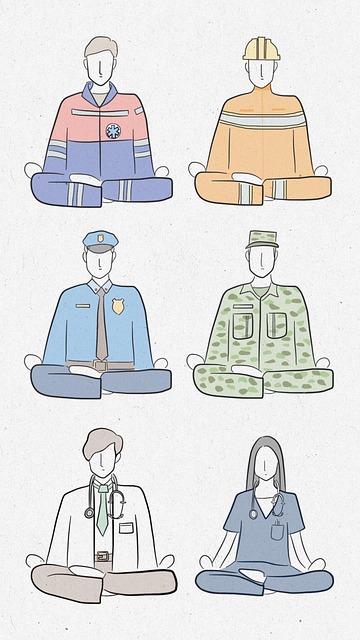Aurora Children Therapy prioritizes client safety and emotional well-being through comprehensive risk assessment, proactive mitigation strategies, and evidence-based techniques like mindfulness meditation. They focus on early intervention for depression, integrating journaling exercises and supportive atmospheres to foster effective coping skills tailored to each child's unique needs. Their approach includes systemic issue addressing, crisis management training, and dynamic risk planning based on ongoing monitoring, peer collaboration, and new research, ensuring exceptional mental health care.
“Risk management is an indispensable aspect of mental health practice, ensuring safe and effective therapy. This article explores a structured approach to risk assessment and mitigation tailored for professionals at Aurora Children Therapy. We delve into identifying risks specific to child therapy settings, offering a comprehensive framework for evaluation. By implementing proven strategies, Aurora can enhance its risk management practices. Continuous monitoring and regular reviews are key to adapting to evolving challenges. Discover how these steps contribute to a resilient and secure therapeutic environment.”
- Understanding Risk Management in Mental Health Practice
- Identifying Potential Risks at Aurora Children Therapy
- Developing a Comprehensive Risk Assessment Framework
- Implementing Effective Risk Mitigation Strategies
- Continuous Monitoring and Review Process
Understanding Risk Management in Mental Health Practice

Risk management is an integral part of any mental health practice, aiming to ensure a safe and supportive environment for clients, especially vulnerable populations like children. At Aurora Children’s Therapy, we understand that effective risk assessment and mitigation are crucial in fostering emotional well-being. By implementing robust risk management strategies, therapists can create a secure space, facilitating open dialogue and enhancing therapeutic outcomes.
This process involves identifying potential hazards, such as triggering events or unsafe behaviors, and putting measures in place to prevent or respond to them promptly. Mindfulness meditation techniques, for instance, can be powerful tools to support clients in managing anxiety and stress, thereby reducing the risk of adverse reactions. Additionally, promoting healthy coping mechanisms and teaching emotional well-being promotion techniques are proactive steps towards depression prevention, a key concern in mental health care.
Identifying Potential Risks at Aurora Children Therapy

At Aurora Children Therapy, identifying potential risks is a multifaceted process that involves assessing various aspects of the therapeutic environment and client interactions. Mental health professionals at our practice recognize that working with children comes with unique challenges. One key area of focus is preventing and managing depression among young clients, as early interventions can significantly impact long-term mental wellness. This proactive approach extends beyond traditional therapy sessions; it includes integrating mental wellness journaling exercise guidance into daily routines to help children express their emotions and track progress.
Furthermore, fostering a safe and supportive atmosphere encourages the development of effective coping skills. Our therapists are trained to identify signs of distress and implement strategies tailored to each child’s needs. By promoting open communication, regular check-ins, and evidence-based techniques, Aurora Children Therapy aims to mitigate risks and ensure the well-being of every young person we serve.
Developing a Comprehensive Risk Assessment Framework

At Aurora Children Therapy, we understand that risk management planning is a cornerstone for any mental health professional seeking to deliver quality care. A comprehensive risk assessment framework serves as a powerful tool, enabling practitioners to identify potential hazards and implement effective mitigation strategies tailored to individual client needs. This process involves a multi-faceted approach, encompassing not only the assessment of clinical risks but also environmental factors and social determinants that may impact a child’s emotional well-being.
By integrating a Community Outreach Program Implementation strategy into their risk management plan, mental health professionals can proactively address systemic issues affecting their clients. Equally important are initiatives aimed at enhancing Emotional Regulation and Social Skills Training, which empower children with coping mechanisms to navigate challenges and foster healthier interactions. Such holistic measures not only bolster the effectiveness of therapy but also contribute to the overall resilience of the young individuals in our care.
Implementing Effective Risk Mitigation Strategies

Implementing effective risk mitigation strategies is paramount for mental health professionals to ensure a safe and supportive environment, especially when working with vulnerable populations like children. At Aurora Children’s Therapy, we prioritize proactive measures to safeguard both clients and therapists. This involves regular training in crisis intervention and de-escalation techniques, ensuring therapists are equipped to handle diverse emotional landscapes.
By integrating confidence-boosting mental wellness coaching programs into their development, professionals can enhance their resilience and adaptability. Such initiatives empower them to navigate challenging situations with grace and expertise, fostering a culture of safety and trust. Effective risk management planning goes beyond compliance; it empowers mental health professionals to create nurturing spaces that promote healing and growth.
Continuous Monitoring and Review Process

At Aurora Children Therapy, we understand that risk management planning is an ongoing process for mental health professionals, requiring continuous monitoring and review. This dynamic approach ensures that strategies remain relevant and effective in addressing evolving challenges and emerging risks within the field of child therapy. Regularly assessing the impact of new research, treatment modalities, and legislative changes on our practices is paramount.
Through diligent monitoring, therapists can identify potential risks early on, allowing for prompt intervention and mitigation. This process involves regular self-reflection, peer collaboration, and feedback mechanisms to foster a culture of continuous improvement. By integrating coping skills development, social skills training, and emotional intelligence into our risk management framework, we empower both therapists and clients to navigate challenges proactively while cultivating resilience and adaptive coping strategies.
Mental health professionals, like those at Aurora Children Therapy, operate in a complex environment where effective risk management is paramount. By understanding the potential risks, developing robust assessment frameworks, and implementing tailored mitigation strategies, practitioners can ensure a safer and more supportive therapeutic environment for their clients. Continuous monitoring and regular review are essential to adapt to evolving challenges, ensuring that best practices in risk management remain dynamic and responsive to the unique needs of both patients and therapists.














